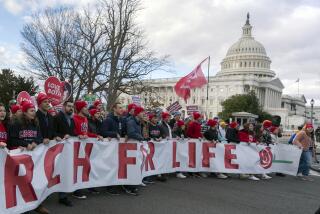Dole Seeks to Revive Provision in Health Reform Bill
- Share via
WASHINGTON — The landmark health insurance reform bill approved just two days ago by the Senate became mired in legislative limbo Thursday as Majority Leader Bob Dole (R-Kan.) tried a power play to revive a major provision killed over his objections earlier in the week.
Relying on arcane parliamentary procedures available to him as Senate majority leader, Dole is trying to resuscitate his defeated proposal to create “medical savings accounts,” under which Americans could set aside money tax-free to pay medical bills.
That move could threaten enactment of the insurance “portability” bill, which would help millions of Americans retain their insurance coverage even if they develop a serious illness or leave a job.
Dole’s maneuvering has also heightened concerns among some congressional Republicans and his own political aides that his presidential campaign is stumbling in part because voters have little interest in or appreciation for the insider skirmishing he and other congressional leaders use to press their agenda in Congress.
Dole ignited the controversy when he sought to appoint seven Republicans but only four Democrats to a Senate-House conference committee that is to resolve several important differences between the Senate bill and a similar measure passed last month by the House.
The makeup of the Senate contingent is important because the House legislation includes the medical savings accounts. But because Senate Democrats unanimously opposed the provision, Dole is seeking to appoint a delegation tilted in favor of medical savings accounts.
On Thursday, Democrats refused to go along with Dole’s plan for the committee, pushing the issue to next week. Led by Sen. Edward M. Kennedy (D-Mass.), Democrats called Dole’s maneuvers “nothing short of an attempt to hijack” the health care bill.
“The Senate already has spoken,” Kennedy said, referring to the 52-46 vote last Thursday night that rejected a Dole amendment to incorporate the medical accounts into the underlying bill. The Senate then approved it by a 100-0 vote.
Senior White House officials in recent days have said that President Clinton would veto an insurance reform bill that contained the medical accounts.
By continuing to press for savings accounts, Dole evidently believes either that Clinton would not make good on his threat to veto the bill, or that if he did, he would hand Dole a powerful argument for the campaign: Three years after Clinton made health care reform the centerpiece of his first term, he vetoed the most important health reform bill in three decades.
“He wants to establish a record,” said Sen. Robert F. Bennett (R-Utah), a Dole confidant. “So when he campaigns on it, he can say: ‘I tried to bring it back.’ ”
The dispute has contributed to a high-level reassessment in the Dole campaign, which has been struggling to reach the launch pad in the weeks since the Kansas senator sewed up the GOP nomination.
Republican sources said that campaign aides are now questioning whether Dole should continue with his strategy of conducting much of his campaign from the Senate chamber. Those aides believe such a strategy is not capturing the attention of voters--or perhaps worse, is shining a spotlight on the sort of political gamesmanship long practiced in Washington but little loved elsewhere.
At the same time, many of Dole’s Senate colleagues, with an increasing sense of urgency, are pressing him to step down as majority leader and to take his campaign out to the country--even though his campaign is short on funds.
“He just doesn’t need to be seen every day arguing in there with [Senate Minority Leader] Tom Daschle or Ted Kennedy,” one Republican senator said Thursday.
The health care reform bill bans various discriminatory insurance industry practices, particularly those directed at people who purchase private insurance and those with a “preexisting” medical condition.
Independent analysts estimate that 25 million Americans a year could benefit from having portable health insurance, while as many as 80 million have ailments that could subject them to exclusion from coverage because of “preexisting conditions.”
The bill also would increase from 30% to 80% the tax deductibility of health insurance premiums paid by an estimated 17 million self-employed Americans and their dependents. (The House bill would increase the percentage to only 50%.)
Backers of the medical savings accounts say they would instill cost consciousness among consumers and allow them unrestricted choice of physicians. But critics say the accounts could destabilize the insurance market and lead to a two-tiered system in which the healthy end up with potentially lucrative medical savings accounts while the ill are left behind, facing rising insurance premiums.
Under Dole’s proposal for the makeup of the Senate conferees, only two Republicans would have come from the Finance Committee--Dole and Chairman William V. Roth Jr. (R-Del.), who also supports the savings accounts. Excluded from the committee would be the panel’s third-ranking Republican, John H. Chafee (R-R.I.), one of five Republicans who voted against the medical accounts.
Unfortunately for Dole, Democrats refused to grant unanimous consent to his proposal. Instead, the Democrats offered several proposals of their own, which Dole rejected.
More to Read
Get the L.A. Times Politics newsletter
Deeply reported insights into legislation, politics and policy from Sacramento, Washington and beyond. In your inbox twice per week.
You may occasionally receive promotional content from the Los Angeles Times.










